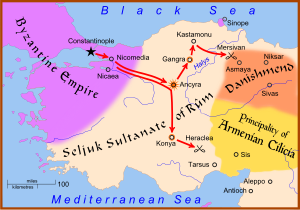
Back حملة 1101 الصليبية Arabic Cruzada de 1101 AST ۱۱۰۱صلیب ساواشی AZB Кръстоносен поход от 1101 Bulgarian ১১০১-এর ক্রুসেড Bengali/Bangla Croada del 1101 Catalan Křížová výprava roku 1101 Czech Kreuzzug von 1101 German Σταυροφορία του 1101 Greek Cruzada de 1101 Spanish
This article or section is in a state of significant expansion or restructuring. You are welcome to assist in its construction by editing it as well. If this article or section has not been edited in several days, please remove this template. If you are the editor who added this template and you are actively editing, please be sure to replace this template with {{in use}} during the active editing session. Click on the link for template parameters to use.
This article was last edited by [[User:|]] ([[User talk:|talk]] | contribs) 0 seconds ago. (Update timer) |
You can help expand this article with text translated from the corresponding article in Italian. (June 2024) Click [show] for important translation instructions.
|
| Crusade of 1101 | |||||||
|---|---|---|---|---|---|---|---|
| Part of the First Crusade | |||||||
 A map of western Anatolia, showing the routes taken by Christian armies | |||||||
| |||||||
| Belligerents | |||||||
| |||||||
| Commanders and leaders | |||||||
|
Anselm IV of Milan † Stephen of Blois † Stephen of Burgundy Eudes of Burgundy Constable Conrad Girard I of Roussillon Raymond IV of Toulouse General Tzitas William II of Nevers William IX of Aquitaine Hugh of Vermandois † Welf of Bavaria Ida of Austria † | Kilij Arslan | ||||||
| Casualties and losses | |||||||
| High | Relatively low | ||||||
The Crusade of 1101 was a crusade of three separate movements, organized in 1100 and 1101 in the successful aftermath of the First Crusade. It is also called the Crusade of the Faint-Hearted due to the number of participants who joined this crusade after having turned back from the First Crusade.
Calls for reinforcements from the newly established Kingdom of Jerusalem, and Pope Paschal II, successor to Pope Urban II (who died before learning of the outcome of the crusade that he had called), urged a new expedition. He especially urged those who had taken the crusade vow but had never departed, and those who had turned back while on the march. Some of these people were already scorned at home and faced enormous pressure to return to the east; Countess Adela of Blois was so ashamed of her husband, Count Stephen, who had fled from the siege of Antioch in 1098, that she would not permit him to stay at home.[1]
- ^ Cate, James Lea (1969). "The Crusade of 1101". In Setton, Kenneth M.; Baldwin, Marshall W. (eds.). A History of the Crusades: I. The First Hundred Years. Madison: The University of Wisconsin Press. pp. 343–352.